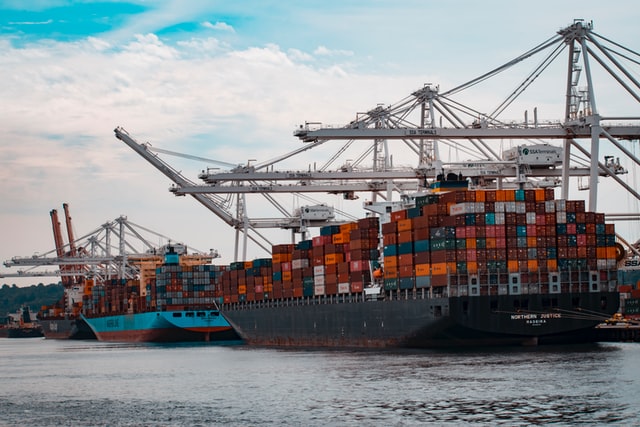
China’s growing access to global shipping data, a trade secret on which has been kept by the U.S., is causing great concern among American carriers and shippers. The United States Trade Representative acknowledged that while China had pledged not to share this information with other countries, there was nothing preventing it from sharing or selling sensitive commercial data in the future.
China’s growing control over data on global shipping movements is raising concerns in Washington and among industry experts that Beijing may use the data for economic or geopolitical gain.
Even freight that never reaches Chinese shores is often routed via Beijing’s global logistical networks, including sophisticated data systems that trace shipments passing through ports outside of China. According to cargo-industry officials, Beijing’s control over the movement of products and information about them provides it unique insight into global trade and the opportunity to affect it.
With ports all around the world crowded and shortages affecting a variety of sectors, shipping data has become a very valuable commodity.
Logink, a digital network that connects shippers globally and bills itself as a “one-stop logistics information service platform,” is the most prominent of China’s cargo-data systems. Logink claims to use a combination of public databases and information input by more than 450,000 users in China and at dozens of massive ports around the world, including as part of China’s trillion-dollar international infrastructure project, the Belt and Road Initiative, and the Digital Silk Road.

In 2019, Chinese President Xi Jinping and Greek Prime Minister Kyriakos Mitsotakis paid a visit to the Greek port of Piraeus. The Greek maritime industry reacted angrily to Chinese-led data collection activities at the port.
Getty Images/Orestis Panagiotou/Agence France-Presse
Logink’s global reach illustrates a crucial area of the global economy in which the West lags behind China. For years, shippers have wished for the digitization of shipping data.
The non-profit organization has been in existence since 2007. China’s Ministry of Transportation is in charge of Logink. Its increasing ties to international ports and logistical networks are beginning to attract Washington’s notice.
According to Michael Wessel, a commissioner on Congress’s U.S.-China Commercial and Security Review Commission, Logink’s window into global commerce “may provide the data bearer a treasure mine of information of national security and economic importance.”
Mr. Wessel said, “It should be a far larger worry than it has been.”
Military equipment is sent via civilian ports all around the globe by the Defense Department. “China is attempting to expand its visibility into the global supply chain, including U.S. military logistics,” a spokeswoman for its logistics branch, Transportation Command, said. The representative declined to comment on Logink specifically.
Questions regarding the system were not answered by Logink or the Chinese Ministry of Transportation.
Logink, formerly known as the National Public Information Platform for Transportation and Logistics, has been growing in China for years, leveraging the country’s size and combining cargo data and financial data from shipping, trucking, and manufacturing firms. Logink started forming agreements with ports around Asia in 2010, promising speedier trade flows. It has lately established connections with Belt and Road ports and cargo-data systems in Europe and the Middle East.

China’s supply-chain data networks have evolved as a result of central management in a large economy, demonstrating what can be done with digitizing logistics, according to industry executives.
Photo credit: EPA/Shutterstock/Alex Plavevski
According to Logink’s website, the company’s capacity to share information worldwide “serves the ‘One Belt One Road’ national plan” and has “become a ‘Chinese window’ enabling China to integrate international logistics information exchange and sharing.”
Because of a new data-privacy regulation that went into effect in November, China is increasing its window into global freight movements. Global access to ship-location information in Chinese seas has plummeted.
Concerns concerning Logink are similar to those raised about Huawei Technologies Co. and ZTE Corp., two Chinese telecommunications companies: they all transmit data from third parties that Chinese authorities may use to benefit China or harm people that interact via the networks. China could discover and exploit shortages, gluts, and trends before others, according to industry officials, by processing data transcending Logink.
“The most apparent danger of Logink is that, because of its data insights, it might assist Chinese firms expand quicker,” said Mees van der Wiel, a business consultant at Portbase, Europe’s biggest port’s digital data network.
Cosco, a Chinese state-owned shipping business, announced in 2018 a digital system similar to Logink for Greece, which includes Cosco’s ownership of the massive Port of Piraeus outside of Athens. Greek maritime industry executives were concerned that the system might provide China with sensitive information about their commercial activities, as well as intelligence on the Greek navy. Under pressure from business, the Greek government approved a legislation in January mandating that any such system and the data it gathers be under the exclusive authority of the state.

The Belt and Road Initiative, led by China, is assisting in the development of ports and other projects throughout the world, including this construction site in Cairo’s new central business area.
Photo credit: EPA/Shutterstock/khaled elfiqi
Cosco’s Piraeus unit spokeswoman said the firm was pleased with the government’s announcement of a single national system and that it will join as needed.
Shippers commonly transmit paperwork regarding marine freight to its destination via air, and the logistics business remains largely dependent on physical documentation across the world. A cargo may transit through over 40 distinct companies, including freight handlers, customs agents, and port operators, all of whom use separate information systems.
Many efforts are underway throughout the globe to unify and simplify this. They gather and share information on the location, routes, and contents of ships and millions of cargo containers moving everyday in order to make shipping more efficient and less polluting.
Ports, private enterprises, and industry coalitions are leading most of these activities. Many organizations struggle to recruit participants because the logistics sector is intensely competitive, causing them to carefully preserve data that may provide competitors an advantage. At a recent conference in Copenhagen on “smart marine networks,” many presenters bemoaned the industry’s inability to increase efficiency via data exchange.
The United States intends to challenge China’s global power by providing infrastructure, vaccinations, and renewable energy. The proposal, called Build Back Better World, attempts to compete with China’s Belt and Road Initiative, according to Stu Woo of the Wall Street Journal. Daniel Orton contributed to this composite photo.
“In today’s logistics, the movement of information is as crucial as the flow of money or commodities,” said Inna Kuznetsova, a logistics specialist and the CEO of New York-based data analytics firm 1010Data.
Companies are won over by Portbase in Rotterdam’s promise that they would always retain control of data on the system. Portbase, one of the most advanced digital shipping hubs outside of China, promises to handle data exclusively with the authorization of the owners. However, Portbase is limited to the Netherlands.
In 2019, Portbase and Logink signed a preliminary collaboration agreement, but development has been sluggish during the epidemic, and the two parties haven’t been direct negotiations this year, according to Mr. van der Wiel.
China has shown what is possible in logistics digitization by gathering so much data and facilitating collaboration throughout supply chains.
“‘In today’s logistics, information flow is just as crucial as money or products movement.’”
— Inna Kuznetsova, CEO of 1010Data, a data-analytics business
“Logink is a technological masterpiece that would be the envy of other platforms,” said Andre Wheeler, a former logistics executive currently working as a consultant in Perth, Australia, who has studied Logink for many years. He thinks that Logink is a decade ahead of other systems, making it appealing to other nations to join “because they can skip the technological development stage.”
According to Emily de La Bruyère, a founder of Horizon Advisory, a consulting company in Washington that investigates China’s combination of business and politics, Logink enables users to interact and exchange information in a similar fashion to Facebook. According to Ms. de La Bruyère, the Chinese government’s ownership of Logink affords it access into data traversing the network, akin to Amazon.com’s perspective of trade throughout its platform.
It’s unclear who has access to the data Logink obtains and how much it collects at ports outside of China. Officials from Logink and the Chinese Ministry of Transportation did not react to queries concerning the company’s data collecting and use.
Even industry insiders who contact with Logink aren’t sure how it works.
“They provide presentations on their technology, but we don’t know what’s behind it,” Mr. van der Wiel of Rotterdam’s Portbase said. If Chinese data-protection standards enable Logink’s data to be merged with customs data, he says, “then you truly have a gold mine” of price, volume, and consumer data.
Subscribe to our newsletter
Report on Logistics
Top news and in-depth analysis on everything from supply chain to transportation and technology in the field of logistics.
Mr. Wheeler claims that his long-time logistics business contacts who use Logink are likewise unsure how the data they submit is handled or utilized. He claims that these folks are afraid of upsetting Chinese officials if they speak out openly about it.
Logink’s blend of data processing and sea transportation, all on a global scale, meshes with China’s mix of high- and low-tech to bolster its geostrategic position, according to Isaac Kardon, an assistant professor at the US Naval War College. “If you own the information, you may mix up someone else’s knowledge or change things about without people knowing,” he said.
Rare earths are one source of worry, according to researchers knowledgeable with Logink. In order to reduce its dependency on China for materials used in everything from vehicles and electronics to military systems, the US has turned to Australia. Through Australian miner Lynas Rare Earths Ltd, the close US ally, which is feuding with China over trade and diplomacy, supplies what Washington deems a more secure supply of the essential commodities.
Lynas, on the other hand, processes its rare earths in Malaysia, where they pass through at least one Belt and Road port, Kuantan, controlled by Chinese state-owned enterprises.
Logink is one of numerous services that use publicly accessible customs data, according to Lynas Managing Director Amanda Lacaze, and does not represent an extra danger. Lynas intends to expand its processing capacity in the United States, she added.
Logink might acquire privileged access to data at Kuantan and other ports, according to shipping data specialists, thanks to its Belt and Road links. According to experts, such data sources might provide China with information on unit costs, product mix, and eventual beneficiaries of shipments. Questions regarding the Kuantan Port Authority’s usage of Logink were not answered.
Private firms are also gathering global data, such as E2open LLC’s Inttra ocean-booking platform, which can monitor nearly one-fourth of the world’s container shipments—a subset of the data Logink gathers.
The Chinese government’s administration of Logink, which is extensively engaged in its country’s business operations, “changes the dynamic,” according to E2open Executive Vice President Pawan Joshi. “Competing with an incorporated country is tough for free businesses.”
—This article was co-written by Rhiannon Hoyle.
Daniel Michaels can be reached at [email protected].
Dow Jones & Company, Inc. All Rights Reserved. Copyright 2021 Dow Jones & Company, Inc. 87990cbe856818d5eddac44c7b1cdeb8











